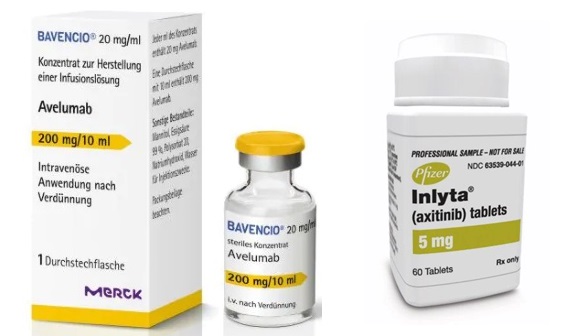When treating advanced renal cell carcinoma (RCC) patients with an immune checkpoint inhibitor (ICI) and a vascular endothelial growth factor receptor (VEGFR) inhibitor, physicians should monitor patients with high baseline troponin T levels more closely for major adverse cardiovascular events (MACE), a study showed.
According to the outcome of the phase 3 JAVELIN Renal 101 trial published in the Journal of Clinical Oncology, advanced RCC patients with high baseline troponin T levels had three times higher risk of MACE than those with low baseline troponin T levels when they received ICI and VEGFR combinations.

JAVELIN Renal 101 compared Bavencio plus Inlyta (axitinib) with sunitinib in advanced RCC. The study is the first randomized comparative trial that prospectively monitored left ventricular ejection fraction (LVEF) and serum cardiac biomarkers among studies of ICI and VEGFR combinations.
The study said that combination therapy with ICIs and VEGF pathway inhibitors is an effective treatment for several tumor types, including advanced RCC.
However, VEGFR inhibitors can cause cardiovascular adverse events such as hypertension, cardiomyopathy, cardiac failure, and thromboembolic events, it noted.
ICIs can also cause inflammatory cardiovascular side effects, including myocarditis, pericarditis, vasculitis, and arrhythmias, the research team went on to say.
“Although ICI-related myocarditis occurs in only approximately 1 percent of ICI-treated patients, it has a high fatality rate (46 percent), and almost 80 percent of events occur within six weeks of treatment initiation, highlighting a need for early detection,” the research team added.
However, it is still unknown whether the combination of ICIs with VEGFR inhibitors increases the risk of cardiovascular adverse events.
The research team assessed the association between MACE and changes in LVEF or baseline levels of serum cardiac biomarkers (troponin T and I, BNP, NT-proBNP, and CK-MB).
The research team paid particular attention to troponin T, a biomarker of myocardial inflammation and damage caused by myocarditis.
In the Bavencio plus Inlyta group, a higher proportion of patients (6/35) with high baseline troponin T developed MACE versus patients without high baseline troponin T (7/135).
In the sunitinib group, the occurrence of MACE was not significantly different between patients with or without high baseline troponin T levels.

